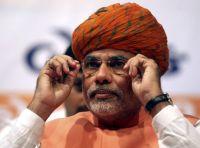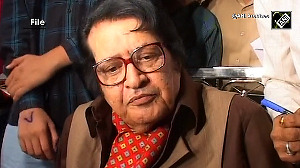 What sets Modi apart from the BJP's other successful CMs is that a whiff of the smoke of 2002 still clings to his clothing, notes Mihir S Sharma.
What sets Modi apart from the BJP's other successful CMs is that a whiff of the smoke of 2002 still clings to his clothing, notes Mihir S Sharma.
It is said Bill Clinton, the greatest politician of our lifetimes, won the 1992 US presidential election because of a single speech. It was not his best speech; in fact, it may have been one of his worst -- but that doesn't matter. Clinton had already been nominated by the Democratic Party as its candidate when he delivered the speech to an audience selected by African-American leader Jesse Jackson.
It was an unremarkable save for a startling attack on a rapper named Sister Souljah. This otherwise deservedly forgotten product of early 1990s youth culture had, in a music video, declared that "if there are any good white people, I've never met them". Clinton called out this fairly obviously racist remark as, well, racist. In so doing, the Souljah Moment legend continues, Clinton tacked sharply from being seen as dangerously progressive on racial issues to something much closer to America's political centre -- a repositioning crucial to his defeat of George Bush the elder in the general election later that year.
The tension between winning a party nomination and winning a wider election is fairly central to presidential politics now -- "the pivot", some call it -- but these little tricks have historically meant little to us, with our Westminster-style system, our diverse electorate, our national elections won on local issues.
But, everywhere, Westminster-style democracies in this age of rule by mass media are drifting towards something quasi-presidential, something almost like the medieval coarseness of a duel between champions chosen by vast armies. Our electorate is becoming less diverse, too, we're told, voting on the single metric of "governance" rather than the infinite variations of our social make-up; and the middle class, political agenda-setters, are becoming truly national rather than local.
The great beneficiary in India of these nationalising tendencies is a certain Narendra Modi -- you may have heard of the fellow, he's chief minister of Gujarat. He's unworried by the drift; after all, a prime minister is merely first among equals while presidents are surrogate kings, and there is little doubt which of those two roles Modi feels is more his due. But what has hitherto been the wind between Modi's well-tailored saffron wings might soon turn and dash him against the side of a cliff. Unless, that is, he learns from Bill Clinton.
For there is one question, and one question alone, that is asked everywhere of Modi these days: when will he directly address the great shadow of 2002? He has learnt to avoid this in unfriendly environments, since the early days when he used to storm off national television interviews. He knows what has worked for him so far, whether at home or by video-link abroad: well-choreographed spectacle where he can reel off statistics about growth of milk production or whatever in a manner that would be reminiscent of our poor, single-minded prime minister - if not for the facts that, first, Modi makes the statistics sound like, well, a war-cry; and second, that Modi's statistics are met with rhapsodies of praise instead of bored yawns and fact-checking.
By sticking to thunderously praising his record of governance, he thinks he can avoid mention of anything to do with 2002 at all.
I remember years ago when he was asked in my presence about the rape of young Muslim women during and after the riots, he responded by reeling off figures suggesting that sex-selective abortion in Gujarat was on the decline among Muslims, ending by saying, "So, see -- my Gujarat is the safest place for Muslim women." In this audacious attempt to avoid all mention of the number one item on his CV, Modi is aided by his army of amateur PR strategists on TV, in middle-class drawing rooms and online, all of whom have bravely moved on from a 2002 that didn't affect them at all, and wonder loudly and obnoxiously why everyone else hasn't.
But this isn't going to be enough. He may well become his party's nominee, and energise its workers. But to win allies, to win the elections and what comes after, will require the equivalent of tacking to the Centre -- and that will mean addressing the riots of 2002 directly. It will mean expressing regret, and accepting responsibility for something that happened on his watch. It will mean distancing himself from his past and continuing attempts to minimise the violence; to explain it away as a natural reaction; to blame the media; and to demonise its Muslim victims.
Many millions are waiting and hoping Modi will do exactly this so they can vote for him with a clear conscience. Others are waiting for it so they can then argue that the sole moral difference between Modi, responsible for 2002, and the Congress, responsible for 1984, will be erased. (It won't, but that's another column for another day.) Without it, Modi won't win.
But Modi seems genuinely reluctant to do so. Perhaps he's biding his time -- waiting to be anointed his party's prime ministerial candidate. But I think there's more to it. Partly, I think that is because he recognises that what sets him apart from the Bharatiya Janata Party's other successful chief ministers is not his ability or achievements as an administrator, but that a whiff of the smoke of 2002 still clings to his clothing.
Many who profess to prefer his hardness on reform to the softness of others in his party and outside actually are attracted to his hardness in forging a masculine, Hindu Gujarati identity anew in 2002's fires. By softening on the riots, he will lose that advantage.
But, increasingly, I am also coming to think that Modi has the integrity of his beliefs -- and he genuinely believes that he did nothing wrong 11 years ago. He has trouble expressing regret because he feels no responsibility at all.











 © 2025
© 2025